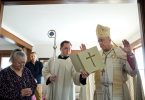(with just the click of a mouse)
by Kara Hansen
KANSAS CITY, Kan. — When Jesus told his disciples to go out and preach the good news, he likely did not have a keyboard, computer screen and mouse in mind.
Or, maybe he did.
“If the church is to dialogue with the culture, we should be aware of how the culture communicates,” said Andrew Strobl, a seminarian for the archdiocese from Queen of the Holy Rosary Parish in Overland Park, who has maintained a Weblog, or blog, for the past four years.
Strobl is just one of a growing number of seminarians — including several from the archdiocese — who see the Internet as a means of communicating and sharing their Catholic faith. As people turn more and more to the Internet as a source of information and communication, it seems only natural that learning about and experiencing the Catholic faith be a part of that as well.
“In this ‘Internet age’ it is important to go where people are who don’t know the good news,” said Barry Clayton, a seminarian from St. Pius X in Mission.
“We are called as followers of Christ to go and bring his good news where it is not, so that all may have a share in the kingdom of God,” he added.
Clayton has an account on the popular social networking Web site, Facebook, along with fellow seminarian Anthony Saiki. Each started accounts as an easy way to keep in touch with family and friends, but soon found it could be used as a way for them to witness to their Catholic faith as well.
“I think that it is crucial for the church to have an interactive presence out there for kids, teens, and really everyone— especially in light of all the sinful Web sites that are out there trying to manipulate and draw people to them,” said Saiki.
“With the world becoming so active on the Internet, I see having a blog as participating and obeying Christ’s command to the apostles to be witnesses to him to all corners of the earth,” he added. “This provides us such a great chance to reach ‘all corners of the earth’ with the click of a mouse.”
Different types of Web sites provide different opportunities for interaction and evangelization. Facebook.com, for example, allows users to post basic information about their current job, school, and location, as well as giving users the ability to send messages to fellow Facebook users and to join online groups together.
A blog maintained on a site such as xanga.com, on the other hand, allows its users to post a narrative about whatever they like and provides space for people to write comments back.
Though Strobl only blogs entries on xanga.com every few months, he writes on a wide range of topics — “life issues, the priesthood, music videos, brownies . . . whatever sparks a thought that I want to share.”
Blogs and Facebook accounts are open to the public, and anyone can read them. Knowing that, each of the seminarians uses his blog as more than a way to keep in touch. It’s also a tool for evangelization.
“The way blogs are connected through groups of friends and various links provides a fair chance that someone might stumble onto my blog,” said Strobl. “If they do, I want them to at least ask, ‘Why would anyone want to be a priest? And why does he need brownies?’”
Both Strobl and Shawn Tunink, a seminarian from St. Lawrence Catholic Campus Center, were encouraged to use the Internet as a tool for ministry by fellow seminarian Matty Molnar, who is now deceased. “Matty said I had to get a blog, that this is what all the kids were doing, and it was a key to ministering with youth,” said Tunink. “The average kid spends a lot of time on the Internet, so it’s a good thing to have a Catholic presence out there.”
It was not until Molnar’s death in September 2005 that Tunink started posting regularly.
“After Matty died, I saw how many people were still visiting his blog and how many people he touched. It really inspired me to update more regularly,” said Tunink.
Tunink’s xanga site provided a way for him to chronicle his trip to the Holy Land last winter. Recent topics have ranged from an explanation about his upcoming ordination to the diaconate to discussions of current events, with visits to his site totaling as many as 300 in a given day.
“I know I’m reaching people through the blog, and I hope it’s planting some seeds,” said Tunink.
Despite the positive outcomes, seminarians said there is still a need to exercise caution and good judgment when it comes to the Internet. And while blogs and social Internet networks are popular, that does not mean each person needs to be involved with one. Like many types of ministry, it is not for everyone.
“I don’t feel a strong pull in that direction for me,” said Nathan Haverland, a seminarian from St. Patrick Parish in Kansas City, Kan. “But I do greatly see the need to have seminarians out there who are evangelizing in the digital world and hope that this brings people to Christ.”
Personal preferences aside, the relative anonymity of Internet blogs can be too much of a good thing at times.
“They can provide a forum for rash comments, polemical speech that furthers division, and expressions of vanity. They can also be a huge time commitment,” said Strobl. “Also, discretion in speech is important. If you don’t want everyone in your parish and the whole communion of saints to read an entry, don’t blog it. Remember: Blog not, lest someone read your blog.”
The seminarians also pointed out that while blogging might serve as a valuable ministry, it in no way can take the place of a real-life faith community and the sacraments.
“It can be misused, and people who blog or post comments need to remember to be discreet,” said Tunink. But, on whole, he is optimistic about its use.
“Overall, it’s a positive thing,” he said. “As Catholics, we are encouraged to engage others in the means the secular world gives us and use those means to spread the truth.”






